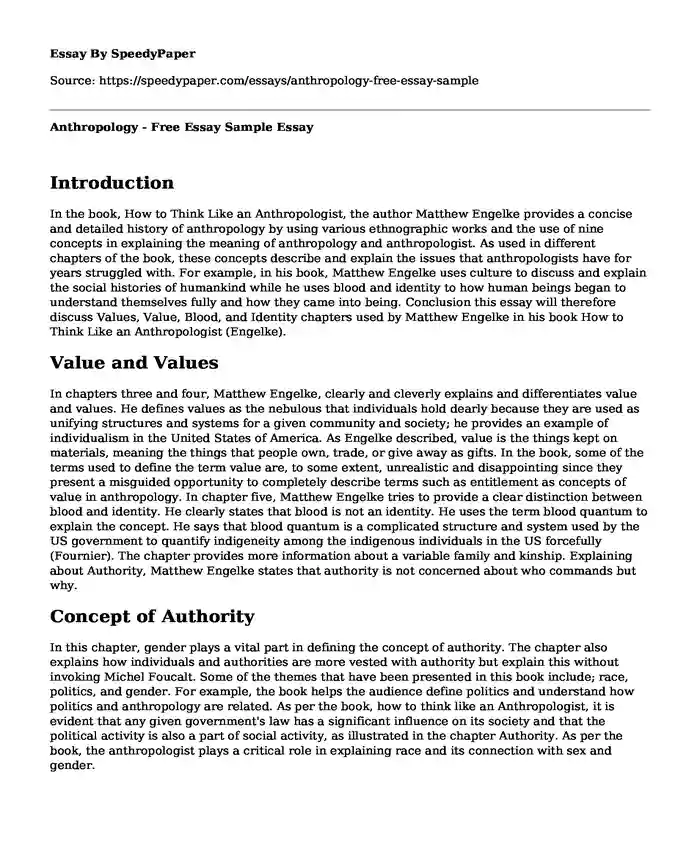
| Type of paper: | Essay |
| Categories: | Literature Anthropology |
| Pages: | 3 |
| Wordcount: | 676 words |
Introduction
In the book, How to Think Like an Anthropologist, the author Matthew Engelke provides a concise and detailed history of anthropology by using various ethnographic works and the use of nine concepts in explaining the meaning of anthropology and anthropologist. As used in different chapters of the book, these concepts describe and explain the issues that anthropologists have for years struggled with. For example, in his book, Matthew Engelke uses culture to discuss and explain the social histories of humankind while he uses blood and identity to how human beings began to understand themselves fully and how they came into being. Conclusion this essay will therefore discuss Values, Value, Blood, and Identity chapters used by Matthew Engelke in his book How to Think Like an Anthropologist (Engelke).
Value and Values
In chapters three and four, Matthew Engelke, clearly and cleverly explains and differentiates value and values. He defines values as the nebulous that individuals hold dearly because they are used as unifying structures and systems for a given community and society; he provides an example of individualism in the United States of America. As Engelke described, value is the things kept on materials, meaning the things that people own, trade, or give away as gifts. In the book, some of the terms used to define the term value are, to some extent, unrealistic and disappointing since they present a misguided opportunity to completely describe terms such as entitlement as concepts of value in anthropology. In chapter five, Matthew Engelke tries to provide a clear distinction between blood and identity. He clearly states that blood is not an identity. He uses the term blood quantum to explain the concept. He says that blood quantum is a complicated structure and system used by the US government to quantify indigeneity among the indigenous individuals in the US forcefully (Fournier). The chapter provides more information about a variable family and kinship. Explaining about Authority, Matthew Engelke states that authority is not concerned about who commands but why.
Concept of Authority
In this chapter, gender plays a vital part in defining the concept of authority. The chapter also explains how individuals and authorities are more vested with authority but explain this without invoking Michel Foucalt. Some of the themes that have been presented in this book include; race, politics, and gender. For example, the book helps the audience define politics and understand how politics and anthropology are related. As per the book, how to think like an Anthropologist, it is evident that any given government's law has a significant influence on its society and that the political activity is also a part of social activity, as illustrated in the chapter Authority. As per the book, the anthropologist plays a critical role in explaining race and its connection with sex and gender.
Conclusion
In his book, Matthew Engelke succeeds in helping the audience think like anthropologists and why they should think like an anthropologist. As Matthew explained, Anthropology is a unique and impressive concept since its explanation depends on the local language; this, therefore, helps people understand themselves better. The issues highlighted by Matthew Engelke are issues of perspectives and problems of logic and critical reasoning. Thus, the book teaches its readers and listeners to question their world perspectives critically and have an in-depth thought of that which is often taken for granted. The books remind its audience that its mode of thinking exists alongside many other alternatives. Conclusively, the book How to Think Like an Anthropologist fully accomplishes its goals and objectives precisely, elegantly, and transparently.
Work Cited
Engelke, Matthew. How to think like an anthropologist. Princeton University Press, 2019. https://books.google.co.ke/books?hl=en&lr=&id=zciXDwAAQBAJ&oi=fnd&pg=PA1&ots=_kLeKqxFaA&sig=jo40rGmZQed3xDiM-R6l7pCfMw0&redir_esc=y#v=onepage&q&f=false
Fournier, Susan, John Quelch, and Bob Rietveld. "To get more out of social media, think like an anthropologist." Harvard Business Review (2016).
https://www.vantage-eval.com/s/To-Get-More-Out-of-Social-Media-Think-Like-an-Anthropologist.pdf.
Cite this page
Anthropology - Free Essay Sample. (2024, Jan 01). Retrieved from https://speedypaper.net/essays/anthropology-free-essay-sample
Request Removal
If you are the original author of this essay and no longer wish to have it published on the SpeedyPaper website, please click below to request its removal:
- Environmental Engineering, Statement of Purpose in a Free Essay
- Cultural Dilemma Essay Sample
- Free Essay Describing Chinese Nationalism
- Exponents - Mathematics Essay Example
- Essay Example: Trend Analysis of the National Center for Education Statistics
- Unveiling Architectural Marvels: A Comparative Exploration of the Pantheon and Chartres Cathedral - Essay Sample
- Engineering: History of Computer Numerical Control (CNC) - Essay Sample
Popular categories




